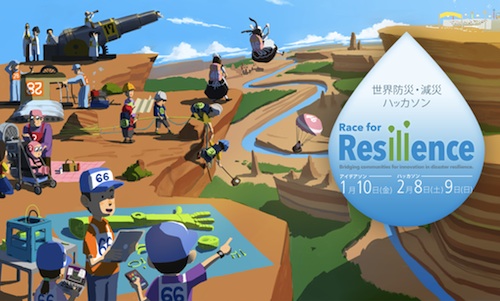Technology
World Bank organized a global disaster response and prevention hackathon for the developing world
2014.02.19 Yumi Yamada

On February 8th and 9th, "The Developing World x Disaster Response and Prevention" hackathon was held in Tokyo, Ishinomaki, and Nagoya to commemorate the launch of the World Bank's Tokyo Disaster Risk Management Hub.
"Hackathon," derived from the words "hack" and "marathon," has become a familiar term in the IT world, but it is still a relatively new word for the rest of the world. "Hacking" can refer to illegally accessing someone's computer, but initially it didn't have a negative connotation. It simply referred to computer savvy people who wrote programs and created software and hardware. And a hackathon is a marathon like event in which hackers get together to compete against each other on one specific theme. In many cases, hackers propose various ideas for the chosen theme, and then each team works on a software or hardware and presents the end product. Often times team get into heated debates and work all through the night, so it's very demanding, but it's also very creative and inspirational - discovering new ideas and working together.
This event was hosted by the World Bank. You may think, why the World Bank? But the World Bank provides funds to developing countries, and it believes that it's important to use knowledge about disaster prevention, so that it may be integrated into development plans and investment programs. The "Tokyo Disaster Risk Management Hub" was recently established to take advantage of the expertise Japan has. And ever since the former Chief Executive of the World Bank, Mr. Robert Zoellick announced the "Open Data Initiative" in 2010, the World Bank has promoted the free and open access to data. Many documents that were subject to fees in the past are now available to all free of charge. And now they have launched "The Developing World x Disaster Response and Prevention" program to promote the active use of such data.
Despite the heavy snow, many pre-registered participants came to take part in this event held at Tokyo University's Komaba Research Campus. People from all generations, nationalities, genders, and from different fields took part in the 2-day hackathon to debate over and develop software and hardware useful in preventing and reducing disasters in developing countries. To support this intensive and lengthy contest, sponsors provided refreshments like pizza and energy drinks. This is another aspect of the contest that makes hackathons so much fun.
Proposing ideas and developing software. photo by Takahashi, Race for Resilience, CC BY
On the afternoon of the second day, the teams presented prototypes of their ideas and the judging took place. Each team researched in advance what products, technologies, and communication tools developing countries really need, narrowed down their choices, and created a working prototype that could be made from cheap, accessible materials. The prototypes ranged from a measuring instrument, alarm system, game, filming equipment, radio stations, to maps, and more.
Out of 16 teams, 1 team, who created the web application, "Save the Baby" won and secured a ticket to the global contest. Many mother-child health books with vaccination and growth records were lost to the tsunami in the Great East Japan Earthquake, so this application aims to digitize such records. In developing countries, phones are the most accessible device, so these records can be entered into the system using phones by following the audio guidance, and the system also lets you confirm the safety of mothers and their babies.
The prototype created by the hackathon winners, Save the Baby. photo by Yumi Yamada
Pioneering initiatives undertaken by the large international institution, World Bank, and the ideas presented by innovative hackers have begun to gradually bear fruit. We may soon see these ideas hard at work in times of disasters.
Related URL/media
![]()









